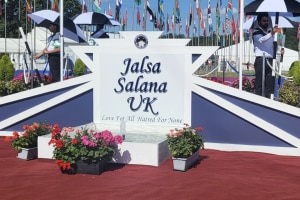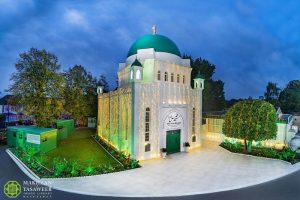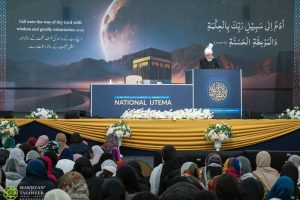KEYNOTE ADDRESS DELIVERED BY HIS HOLINESS, HAZRAT MIRZA MASROOR AHMAD, WORLDWIDE HEAD OF THE AHMADIYYA MUSLIM COMMUNITY, AT EVENT TO MARK INAUGURATION OF THE BAITUL AAFIYAT MOSQUE IN PHILADELPHIA, USA

On the evening of 19th October 2018, the Worldwide Head of the Ahmadiyya Muslim Community, the Fifth Khalifah, His Holiness, Hazrat Mirza Masroor Ahmad (aba), delivered the keynote address at a special reception held to mark the inauguration of the ‘Baitul Aafiyat’ (House of Security) Mosque in Philadelphia, USA. The mosque, which is the first purpose-built mosque in Philadelphia, was officially opened earlier in the day when His Holiness delivered his weekly Friday Sermon. Over 175 dignitaries and guests attended the evening reception held in the new mosque. The event concluded with a silent prayer led by His Holiness. Later, His Holiness personally met with many of the guests who attended the reception. Prior to the reception, the Mayor of Philadelphia, James Kenny and Congressman Dwight Evans were able to have a personal audience with His Holiness. His Holiness also met members of the assembled media and answered questions about the objectives of the new mosque and other related issues. The official transcript of the keynote address, delivered by His Holiness on this occasion, is presented below.

After reciting Tashahhud, Ta’awwuz and Bismillah, Hazrat Mirza Masroor Ahmad (aba), Worldwide Head of the Ahmadiyya Muslim Community said:
“All distinguished guests, Assalamo Alaikum Wa Rahmatullahe Wa Barakatohu – peace and blessings of Allah be upon you all.
First of all, I would like to thank all of our guests who have graciously accepted our invitation and joined us at this special and joyous occasion, where we are inaugurating our new mosque in this city.
It is a fact of life that human beings are such creatures who cannot survive without social interaction and without developing mutual relations with other people. Irrespective of differences of race, religion or social background, we are united as human beings and so it is vital that we interact with other people, rather than isolating ourselves or only mingling with members of our own particular community.
In all respects, dialogue is crucial to breaking down barriers and increasing mutual understanding and knowledge. For the advancement and evolution of society, and to foster an atmosphere of peace and togetherness, respectful discourse and discussion between people and amongst different communities is vital. Therefore, I hold all of you in great esteem for taking time out of your busy lives to join us here today. Regardless of the fact that most of you are not Muslims, you have accepted our invitation and joined us at this purely religious event, where a mosque is being opened. Thus, I cannot proceed further without praising your high levels of tolerance and respect.

Where your participation is a sign of your desire to strengthen your personal ties with members of our community, it also symbolises your eagerness to gain a richer understanding of our religion. It illustrates that you are people who are unwilling to blindly accept hearsay or second-hand information.
In today’s era, where so many reports are inaccurate, your search for the truth about Islam can only be commended. Rather than accepting what the media says about Muslims or what anti-Islam powers try to portray, you have come to see for yourselves what Islam means and represents. For this, I applaud you and offer my sincere thanks.
You may well be aware that the slogan or motto of the Ahmadiyya Muslim Community is, ‘Love for All, Hatred for None’. This motto is nothing new, or something we have suddenly fashioned; rather, this slogan is based on the teachings of Islam’s Holy Book, the Holy Quran and the teachings given to us by the Founder of Islam, the Holy Prophet Muhammad (sa). From the outset, Islam has taught that mutual respect and tolerance are basic human values. For example, in chapter 6, verse 109, the Holy Quran declares that Muslims should not even speak against the idols of non-religious people, because it could provoke them to speak against Allah the Almighty. Thus, to ensure that tensions are not inflamed and to protect society from a cycle of a hate and hostility, Muslims have been instructed to show restraint and patience at all times.

Whilst it is frequently alleged that Muslims do not respect other religions or their religious figures, nothing could be further from the truth. In fact, based upon the teachings of the Holy Quran, Muslims believe that prophets of God were sent to all nations in order to guide and reform the people of those regions. We firmly believe in the truth of all the prophets and believe they were sent to draw mankind towards God Almighty and to teach morality and to establish universal human values, such as freedom of conscience, justice and human sympathy. Given this, how could it be possible for us to disrespect or dishonour other religions, or their followers?
Hence, we Ahmadi Muslims are sincere in our claim that we do not hate anyone. Moreover, we hold genuine love for all people and are ever-ready to extend a hand of friendship to others. Just to give one small example, last year when a local Jewish cemetery was attacked here in Philadelphia and their gravestones were desecrated, the local members of the Ahmadiyya Muslim Community immediately went to offer their support to the Jewish community and to stand in solidarity with them, after that despicable crime. We seek no reward or gratitude for such things, because we are merely following what our religion has taught us, which is to stand shoulder to shoulder with the people of other faiths and beliefs in their times of need or distress. We champion the right of all people to live their lives, free from discrimination or prejudice.
Anyone who is willing to look at Islamic history, objectively and honestly, will see that universal freedom of belief has always been a core tenet of Islam. Indeed, a great manifestation of such pluralism and broad-mindedness was the government that was formed in the Arabian city of Madinah, where the Holy Prophet Muhammad (sa) migrated to, along with many of his followers, after facing years of persecution in Makkah. Alongside the leaders of other religions and communities, the Prophet of Islam (sa) established a covenant that served as the basis for governance in that diverse city. It ensured that all members of society were able to live in peace, free from oppression, and were free to practice their religion or beliefs. Furthermore, according to the customs of the time, each community was bound by their own religious laws or tribal customs. Thus, Muslims followed laws based upon the Islamic Sharia, Jewish people followed laws based upon the Torah and other communities followed laws according to their own customs and beliefs.

At the same time, all people, no matter their faith, had a responsibility to uphold the peace of the state and to treat others with respect. The treaty fostered peace and ensured that a tolerant society prevailed. Thus, more than 1400 years ago, a multicultural melting-pot of a society was successfully managed and administered in Madinah. I am not suggesting that in today’s world there should be a myriad of different laws that exist for different communities living in the same society; rather, my point is simply that our leading priority should always be to establish peace in society, by upholding universal human values and by promoting morality and justice at all levels of society. To explain further, the Holy Quran and the Prophet of Islam (sa) have made it categorically clear that there should be no form of compulsion in matters of religion. Every individual should have the right to choose whatever path he or she wishes to walk upon. Belief is, and should always remain, a matter for one’s heart and one’s mind.
At the same time, Islam teaches that, irrespective of differences of religion or belief, every citizen has a duty to remain peaceful and to ensure that he or she does not take any action that threatens the well-being of society. Islam states that all people should be law-abiding and loyal citizens of the state and work towards its progress and development. Hence, if any of you harbour reservations about this new mosque and fear it will be used by Muslims to plot and scheme against the rest of society or to incite hatreds, let me reassure you that there is no need for any such anxiety or concern. Rest assured, that from this building only a message of love, affection and brotherhood will shine forth.
In this regard, I would like to briefly explain what the purposes of a mosque are. The primary objective of a mosque is to enable Muslims to join together, with a spirit of mutual love and unity, to worship the One God, in the way He has taught. At the same time, the second core objective of a mosque is to be a centre for serving mankind. Every worshipper has a profound responsibility to fulfil the rights of all other members of society. Consequently, a true mosque is both a symbol and manifestation of compassion, benevolence and unity. The history of the Ahmadiyya Muslim Community testifies to the fact that wherever in the world we open mosques, our members who worship there increase their standards of love, sympathy and loyalty towards their fellow citizens. If our mosques serve to incite Ahmadi Muslims, it is not towards terrorism or extremism, it is only towards serving humanity and opening our hearts to our fellow beings. Our mosques increase our determination to spread peace and to cultivate bonds of brotherhood and mutual affection with people from all walks of life and to eliminate all forms of hatred, bigotry and division from society.
This city is known as the ‘city of brotherly love’ and certainly, our new mosque is a sign, and indeed a commitment from us, pledging to intensify our efforts to spread love, brotherhood and goodwill here and beyond. Whilst it is easy to make such claims, our history proves that our words are not shallow, but have real substance. At all times, we strive to practice what we preach. Thus, I am entirely confident that the local community will soon come to appreciate that this mosque, which has been named ‘Baitul Aafiyyat’, and literally means a ‘House of Security’, is a true source of peace for the entire society.
Furthermore, I would like to make it crystal clear that our commitment to peace and our vow to serve humanity is due entirely to our faith and our religious teachings. The Founder of the Ahmadiyya Muslim Community, who we believe to be the Promised Messiah and Imam Mahdi (Guided One), openly proclaimed that he was the Messiah of Muhammad (sa) and that he would follow in the peaceful footsteps of the Messiah who followed Moses (as). And he declared that he had been sent by God Almighty with two outstanding purposes.
Firstly, he was sent to bring mankind back towards its Creator and to draw the attention of people towards fulfilling His rights. Secondly, he came to urge humanity to respect human values and to fulfil the rights of one another. Hence, it is incumbent upon all Ahmadi Muslims, who have accepted the Promised Messiah and Imam Mahdi, to seek every opportunity to become closer to God Almighty and to serve mankind. This is what we have been repeatedly taught by the Holy Quran and the Holy Prophet Muhammad (sa). In chapter 4, verse 37, the Holy Quran states:
‘And worship Allah and associate naught with Him, and show kindness to parents, and to kindred, and orphans, and the needy, and to the neighbour who is a kinsman and the neighbour who is a stranger, and the companion by your side, and the wayfarer, and those whom your right hands possess. Surely, Allah loves not the arrogant and the boastful.’
This single verse of the Quran is a magnificent charter of morality and human rights. It is a golden pathway to peace and a means to brotherly love. In this verse, apart from His worship, Allah the Almighty commands Muslims to treat their parents and relatives with love and affection. He commands them to support and comfort the most vulnerable members of society, such as orphans or those deprived in any way. Thereafter, special mention is made to fulfilling the rights of one’s neighbours. Muslims are taught to love and protect their neighbours and to be ever ready to help them in their times of need.
Furthermore, I should clarify that the definition of a ‘neighbour’ in Islam is extremely vast. It not only includes people who live nearby, but also includes people who live further afield, a person’s travel companions, work colleagues, subordinates and many others besides. In effect, the Holy Quran has declared that all the people living in a Muslim’s town or city are their neighbours. The Holy Prophet of Islam (sa) also repeatedly instructed Muslims to fulfil the rights of their neighbours. Indeed, he said Allah the Almighty had emphasised the importance of discharging the rights of one’s neighbours so fervently to him that he began to think that perhaps they would be included amongst a person’s rightful inheritors. Consequently, if we have built a mosque here in Philadelphia, and if we have established a community of Ahmadi Muslims, we have done so with the intention of increasing the peace and prosperity of this city and serving its people.
Now this mosque is open, the local Ahmadi Muslims will consider all people in this city as their neighbours and recognise that they have many rights over them and will strive to fulfil them to the best of their abilities. Whenever any of you stand in need of help, we pledge to be there to aid and assist, in whatever way we can.


In times of grief and despair, we will always be there to wipe away the tears of our neighbours and to support and comfort them.
Thus, I am sure that you will see for yourselves that where this new mosque is an added physical attraction and landmark in this city, even more significantly, it will spiritually enhance and beautify the society by spreading love and kindness across the city and far beyond. It will prove a beacon of light and hope to all peace-loving people, irrespective of their caste, creed or colour.
With these words, I hope and pray that all people in this city, no matter who they are, or what they believe in, join together and work towards the common good and seek to foster an atmosphere of true and long-lasting peace.
It is said that Philadelphia was the first colonial city, which permitted freedom of religion and freedom of worship in this country. Furthermore, it is the historic city where the Declaration of Independence was signed. Hence, this city has a rich and proud history and it is my prayer that its people are able to build upon their distinguished past and that these great traditions remain a hallmark of your future.
I pray that this city forever remains a beacon of freedom of belief and that the people of this city each play their role in advancing peace, not only in this city, but throughout the United States and indeed, across the world. Even though our membership here remains quite small, I assure you that the Ahmadiyya Muslim Community will always stand ready to support such noble efforts and to offer any help required.
May Allah the Almighty enable for true peace to prevail in all cities and nations.
At the end, I wish to express my sincere thanks to all of you for joining us here today.
May Allah bless you all.
Thank you very much.”




Add Comment